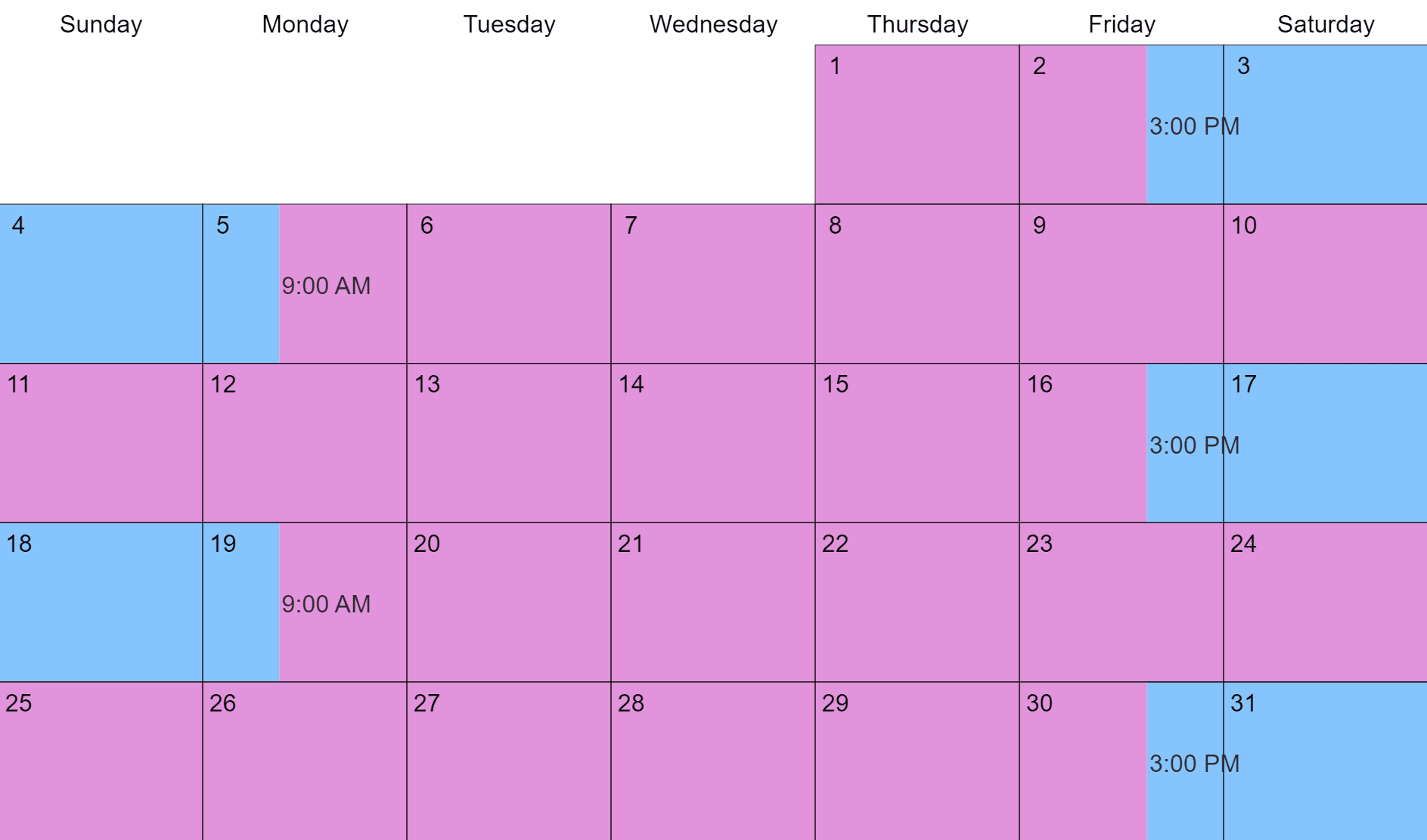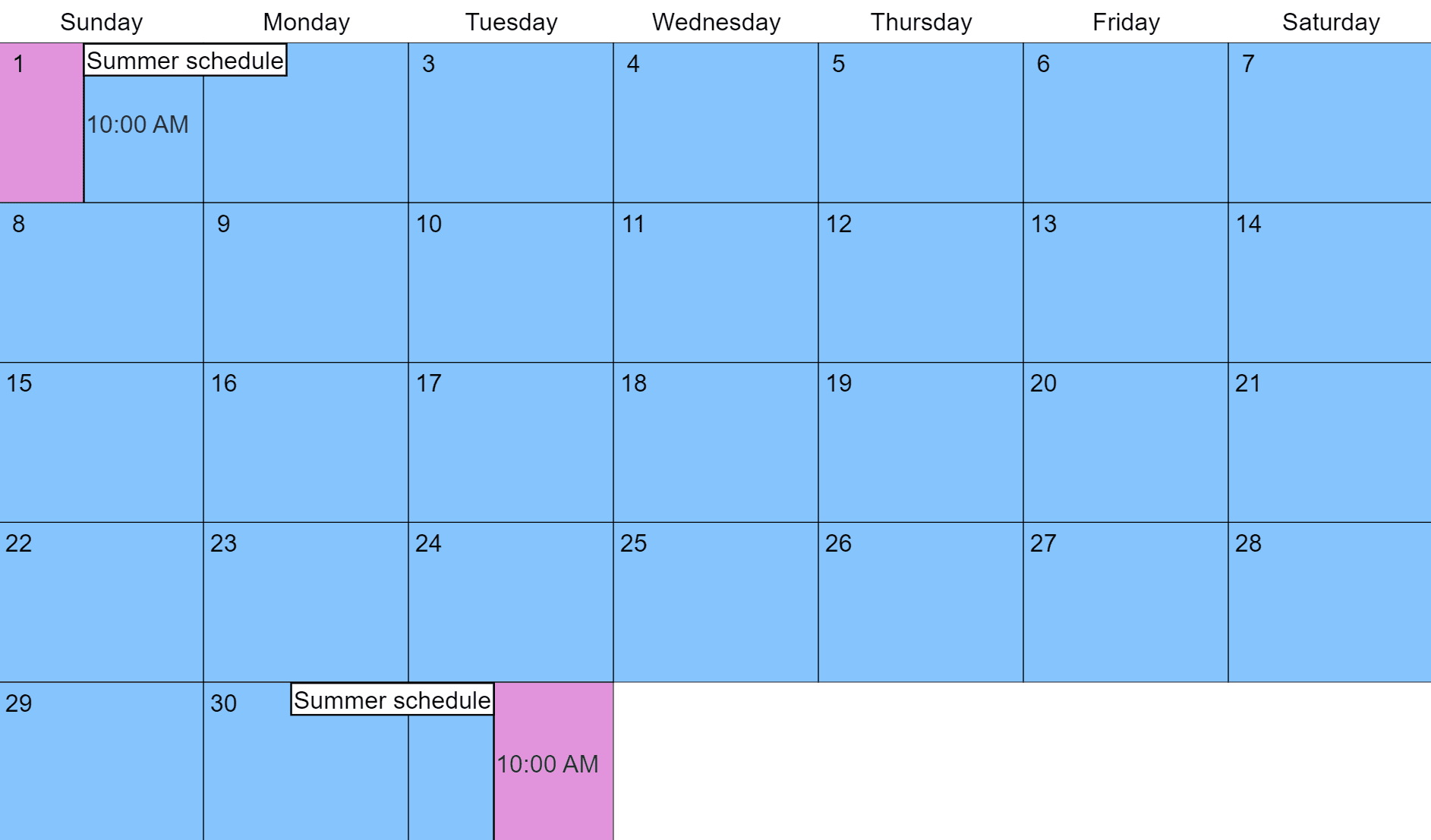Kansas Parenting Time Schedules (Visitation)
Parenting time schedules explain when a child will be with either parent, ideally in both written and visual formats.
A schedule is one part of a parenting plan. Parents can agree on a schedule or let the court decide.
Choosing a schedule
You'll want to choose a schedule that:
- Suits the parents' and child's schedules
- Fits your child's age and needs
- Has doable exchanges (when the child goes from one parent's custody to the other's)
- Accounts for the distance between parents' homes
- Allows flexibility for late or missed visits (e.g., allows for makeup time)
If one parent has a job with a frequently shifting schedule, like working in an oil refinery, you may need multiple schedules to account for each rotation.
Also, consider things like whether a parent is responsible enough to get the child to school on time.
If there are safety concerns, the court can order supervised visits. High-conflict co-parents can use monitored exchanges to help ease tension during exchanges.
Types of schedules
Parents can agree to or propose any schedule they wish.
It should align with your physical custody arrangement. Shared custody schedules give nearly equal or equal time to each parent. Primary residential schedules include visits for the nonresidential parent.
Some counties offer scheduling guidelines to help you choose. The following are aged-based schedule options. Since the child's needs change as they get older, consider creating a step-up parenting plan (also called a stage parenting plan) with schedule changes every few years.
Infants
Infant schedules should avoid disrupting the infant's feeding and sleep schedules. It's recommended the parent who lives outside of the household has frequent visits with the child for short periods throughout the week.
One option is a daytime-only schedule with three-hour visits on weekdays and slightly longer visits on weekends.
 You can customize this with Custody X Change.
You can customize this with Custody X Change.
You could just have a few visits during the week if it suits your schedules better.
 You can customize this with Custody X Change.
You can customize this with Custody X Change.
You may increase parenting time and incorporate overnights once the child stops nursing.
Toddlers
Although toddlers may have daycare and be starting extracurriculars, they still need to have frequent time with both parents. It's recommended that neither parent go more than three days without seeing the child.
The 2–2–3 schedule has your child spend two days of the week with one parent, then the next two days with the other before returning to the first parent for three. The next week the start parent switches.
 You can customize this with Custody X Change.
You can customize this with Custody X Change.
If you don't have shared custody, consider an alternating weekends schedule with a midweek visit.
 You can customize this with Custody X Change.
You can customize this with Custody X Change.
School-age children
Older children are in school and participate in sports and other extracurriculars. They can stand longer separations, but frequent contact is still important.
For shared custody, the 2-2-5-5 schedule places your child in one parent's home for two days, then in the other parent's home for two days. This is followed by five days with the first parent and five days with the second parent.
 You can customize this with Custody X Change.
You can customize this with Custody X Change.
If you don't have shared custody, consider the every extended weekend schedule. The nonresidential parent picks up the child on Friday at 5 p.m., then returns the child Monday morning. You can add a weekday visit, for example from 5 p.m. to 8 p.m.
 You can customize this with Custody X Change.
You can customize this with Custody X Change.
Teenagers
Teenagers have social lives, school and jobs. They typically prefer to stay in one spot for longer to not disrupt their schedules.
With the alternating weeks schedule, the child stays with each parent for one week at a time.
 You can customize this with Custody X Change.
You can customize this with Custody X Change.
If you don't have shared custody, consider something like a 1st, 3rd, and 5th weekends schedule. If there's no fifth weekend in the month, the nonresidential parent will just have the first and third weekend.
 You can customize this with Custody X Change.
You can customize this with Custody X Change.
Holidays and school breaks
Parents often butt heads about who gets to see the children during school breaks. While you can continue to follow your regular schedule, creating a separate schedule can help you avoid dustups.
It's most common for parents to take turns having the child on major holidays every year — e.g., if one parent gets Independence Day this year, the other gets it next year.

During summer break, parents often have several consecutive weeks with their children. If a parent lives a long distance away, you might give them the entire summer.
 You can customize this with Custody X Change.
You can customize this with Custody X Change.
For vacations, you can specify exactly when each parent will go away with the kids or grant a certain amount of vacation time to use throughout the year.

The easiest way to make a schedule
If you're like most parents, creating a custody and visitation schedule will feel daunting. How do you write something that meets legal requirements and doesn't leave any loose ends?
The Custody X Change app makes it easy. Either customize a schedule template, or click and drag in your custody calendar to make a schedule from scratch.
Try this with Custody X Change.
Then watch a full description appear in your custom parenting plan.
Try this with Custody X Change.
The combination of a visual and written schedule means your family will have no problem knowing who has the child when. Take advantage of Custody X Change to make your schedule as clear and thorough as can be.
